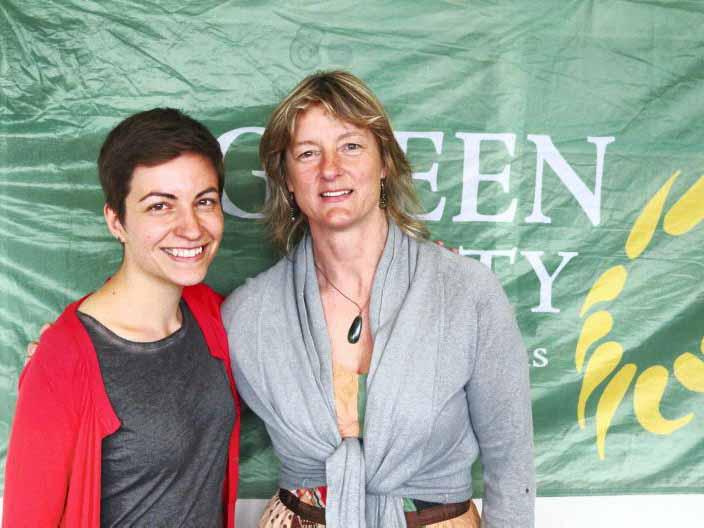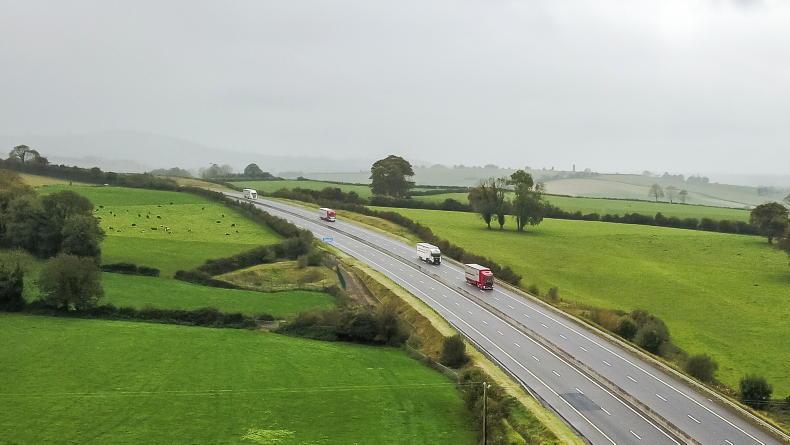Calf live exports can’t be condoned and current animal welfare regulations must be strengthened, according to Green Party MEP Grace O’Sullivan.
The Ireland South MEP said she will vote next week to support the compromises reached at the parliament’s Committee of Inquiry on the Protection of Animals during Transport (ANIT) last month.
The recommendations propose a significant tightening of the regulations around the movement of livestock and would prohibit the transport of unweaned calves under 35 days of age.
ANIT’s proposals could also impose transport time limits of two hours for unweaned animals older than 35 days and a ban on the transport of pregnant animals in the last third of gestation.
Clear conclusions
In a statement to the Irish Farmers Journal, O’Sullivan, who says she comes from a farming family and understands the challenges that many farmers face, said the ANIT committee’s “conclusions are clear”.
She described how after 18 months of fact finding, the ANIT committee concluded that the EU and its member states are “far from fulfilling their duty to ensure animals are protected throughout their entire journey, within Europe and beyond its borders”.
“Current EU legislation aiming to protect animals during transport (Regulation 1/2005) is insufficient, inefficient and is systematically breached.”
Animals mistreated
The Waterford native said she firmly believes that Irish farmers do not want to see their animals “mistreated and exposed to needless trauma and suffering”.
“We have to find alternative ways to farm that are more sustainable and uphold the highest animal welfare standards.
“We are in a period of transition where farmers have a vital role to play but they must be supported and not find themselves out of pocket as they move to ways of farming that will be less harmful on the welfare of animals, whilst still allowing them to rear quality stock, in numbers to meet the needs of a market closer to home.”
Disappointing
O’Sullivan described as “disappointing” the position of her fellow Irish MEP Billy Kelleher.
“Billy says he wants to protect Ireland’s ability to export calves to mainland Europe and increase animal welfare standards. I think those two aims are not compatible.
“I am sure Billy has been engaging with many Irish representatives, from farmers and their associations, to animal welfare organisations and activists. However, he was the only MEP to vote against the final vote on the committee’s recommendations to the [European] Commission.
“Even colleagues from his own political group supported the final outcome.”
Despite saying this, O’Sullivan noted that she will consider Kelleher’s amendments to the transport proposals before the vote next week.
Green position
O’Sullivan clarified the three areas which the Greens-European Free Alliance group, of which she is a member, sought to strengthen the ANIT recommendations to the European Commission.
These include the recommendation of a journey time limit of eight hours (24 hours for sea transport), a ban on the transport of unweaned animals under five weeks and a ban on the transport of gestating animals in the last trimester.
“Our second and third demands were taken on board, whereas our first fell by one vote.”
Other Irish MEPs including Ciaran Cuffe, Chris MacManus, Luke Ming Flanagan and Maria Walsh were contacted for comment.
Read more
Two weeks to save calf exports - MEP Kelleher
Calf live exports can’t be condoned and current animal welfare regulations must be strengthened, according to Green Party MEP Grace O’Sullivan.
The Ireland South MEP said she will vote next week to support the compromises reached at the parliament’s Committee of Inquiry on the Protection of Animals during Transport (ANIT) last month.
The recommendations propose a significant tightening of the regulations around the movement of livestock and would prohibit the transport of unweaned calves under 35 days of age.
ANIT’s proposals could also impose transport time limits of two hours for unweaned animals older than 35 days and a ban on the transport of pregnant animals in the last third of gestation.
Clear conclusions
In a statement to the Irish Farmers Journal, O’Sullivan, who says she comes from a farming family and understands the challenges that many farmers face, said the ANIT committee’s “conclusions are clear”.
She described how after 18 months of fact finding, the ANIT committee concluded that the EU and its member states are “far from fulfilling their duty to ensure animals are protected throughout their entire journey, within Europe and beyond its borders”.
“Current EU legislation aiming to protect animals during transport (Regulation 1/2005) is insufficient, inefficient and is systematically breached.”
Animals mistreated
The Waterford native said she firmly believes that Irish farmers do not want to see their animals “mistreated and exposed to needless trauma and suffering”.
“We have to find alternative ways to farm that are more sustainable and uphold the highest animal welfare standards.
“We are in a period of transition where farmers have a vital role to play but they must be supported and not find themselves out of pocket as they move to ways of farming that will be less harmful on the welfare of animals, whilst still allowing them to rear quality stock, in numbers to meet the needs of a market closer to home.”
Disappointing
O’Sullivan described as “disappointing” the position of her fellow Irish MEP Billy Kelleher.
“Billy says he wants to protect Ireland’s ability to export calves to mainland Europe and increase animal welfare standards. I think those two aims are not compatible.
“I am sure Billy has been engaging with many Irish representatives, from farmers and their associations, to animal welfare organisations and activists. However, he was the only MEP to vote against the final vote on the committee’s recommendations to the [European] Commission.
“Even colleagues from his own political group supported the final outcome.”
Despite saying this, O’Sullivan noted that she will consider Kelleher’s amendments to the transport proposals before the vote next week.
Green position
O’Sullivan clarified the three areas which the Greens-European Free Alliance group, of which she is a member, sought to strengthen the ANIT recommendations to the European Commission.
These include the recommendation of a journey time limit of eight hours (24 hours for sea transport), a ban on the transport of unweaned animals under five weeks and a ban on the transport of gestating animals in the last trimester.
“Our second and third demands were taken on board, whereas our first fell by one vote.”
Other Irish MEPs including Ciaran Cuffe, Chris MacManus, Luke Ming Flanagan and Maria Walsh were contacted for comment.
Read more
Two weeks to save calf exports - MEP Kelleher










SHARING OPTIONS